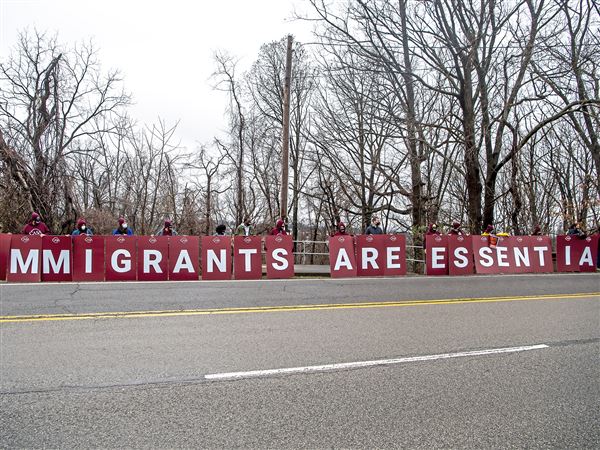For one Duquesne University applicant, the discovery that her SAT college entrance exam erroneously was scored too low is making a huge difference. It turned a letter of rejection into both an offer of admission and a scholarship.
Like other colleges and universities nationwide, Duquesne found itself reopening student files in light of scoring errors discovered on about 4,000 of the 495,000 SAT exams given in October. Errors were found on 319 exams taken in Pennsylvania.
The College Board, which gives the exam, notified colleges on Tuesday and began sending e-mails and letters to students and high schools Wednesday.
At Duquesne University, 22 individuals who asked that their scores be sent there were affected by the scoring error, including 11 who applied, Duquesne spokeswoman Bridget Fare said yesterday.
The largest discrepancy was 80 points, she said. The SAT has three sections, each worth 800 points for a total of 2400 points.
In five of the cases, the effect of the corrections was limited to increases in the school's financial aid offers. But in the instance of one unidentified female applicant, it was a turnaround.
"With new information, we were able to accept her to liberal arts and award a scholarship," Ms. Fare said.
Mike Steidel, director of admission at Carnegie Mellon University, said the College Board identified 91 erroneous score reports sent to that school. Those scores were corrected and reviewed, with the largest change involving an individual whose score had been underrepresented by more than 100 points.
"Fortunately, the student had already been targeted for an admit decision," said Mr. Steidel. "The majority had 10 and 20 point increases."
Mr. Steidel said one candidate was moved to a wait list from a rejection decision. He said the other corrections "really had little impact, but were reviewed again to be sure."
At the University of Pittsburgh, 78 people were affected. The school said the discrepancies of between 10 and 20 points did not affect either admission decisions or financial aid awards.
Of scores sent to Penn State University, 310 tests -- including those for 259 applicants -- were affected, or about 1 percent of those reported to the university from the October test, said Penn State spokesman Geoff Rushton.
The biggest discrepancy at Penn State was 300 points, though most others were modest, he said.
Brian O'Reilly, executive director of SAT information services, said the detective work that led to the discoveries began with two students who in late December asked for their October SAT tests to be rescored by hand. The College Board offers that service but charges $50 if an error isn't found.
Errors were found, but there initially wasn't an obvious explanation, like erasures that were mistaken for answers.
Further investigation determined that the mistakes happened when Pearson Educational Measurement scanned the answer sheets in Austin, Texas.
All of the October tests were scanned again to make sure students received the correct scores. In addition, all of the tests from November, December and January were re-scanned. Errors were found only in some October tests.
David Hakensen, vice president of public relations for Pearson Educational Measurement, released a statement yesterday saying that Pearson has found two "primary technical factors."
One was answer sheets containing "abnormally high moisture content due to humidity in the environment or other factors, which caused the answer sheets to expand and get out of registration."
That was combined with answer bubbles that were marked lightly or incompletely and not read by the scanner.
He said Pearson is creating a software program that will look for evidence of paper expansion when tests are scanned and also will start a process that will allow answer sheets to have "more time to acclimate to our scanning operations."
Tests from 34 states were affected, with the largest number in New York, 1,147. Ten students were affected in Ohio, and none in West Virginia.
Jennifer Topiel, spokeswoman for the College Board, said that 83 percent of the errors were between 10 and 40 points, and 95 percent were less than 100 points. None was greater than 400 points.
In a "handful" of cases, she said, some scores were worse with rescoring, but only scores that should have been higher were changed.
While the College Board is notifying the schools it sent scores to, some colleges do not require applicants to send scores directly from the College Board but instead pick them up from high school transcripts. In those cases, the college officials would not know of the change unless the student alerts them.
Bob Alcorn, guidance department chairman at Fox Chapel Area High School, didn't know of any students at his school who were affected, but recommended that students whose scores were changed call the colleges to which they are applying to make sure they have the correct scores.
The incident shows how flawed test results can be, asserted Robert Schaeffer, public education director with FairTest, a group based in Cambridge, Mass., that has been pushing to de-emphasize the SAT and other standardized tests.
"Repeated incidents of major test score errors like this one should cause Americans to rethink their fixation on standardized testing," he said.
Mr. O'Reilly, who has been with the College Board for 18 years, said scoring difficulties are rare.
First Published: March 10, 2006, 5:00 a.m.
















